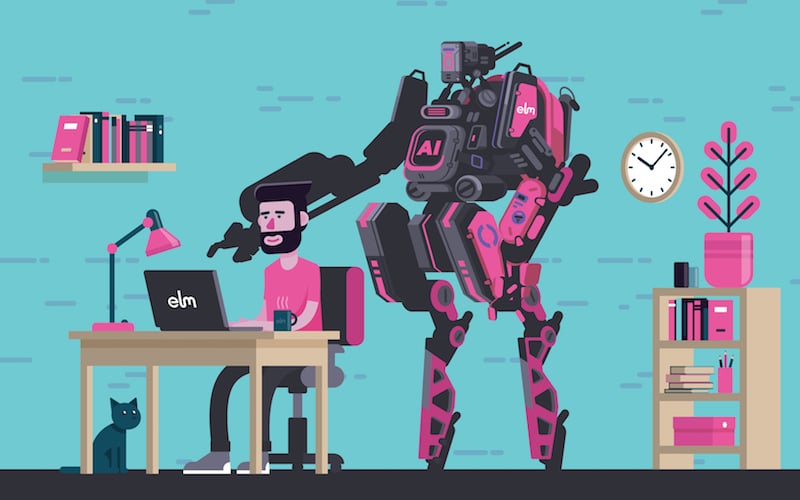We’re standing on the threshold of what the World Economic Forum calls “The Fourth Industrial Revolution,” comparing it to the First Industrial Revolution at the turn of the 19th century. Artificial Intelligence (AI), a byproduct of the digital revolution, is disrupting every industry on the planet, including the learning industry. In 2019 and beyond, we expect to meet an increasing demand for courses covering soft skills like diversity and inclusion or positive leadership.
The Rise of Artificial Intelligence (AI) in the Workplace
“Think about the invention of the automobile. People were worried that carriage drivers would lose their jobs. But look at the millions of jobs the automobile industry created. We can’t anticipate all of the advancements with AI technology, but we can look at how many lives technology has improved and will improve globally.” – Andrew Fayad, CEO of ELM
In the same way that the steam engine gave rise to assembly lines in factories, AI is automating white collar work. In the learning industry, we’re already seeing a subtle shift. Corporations are moving away from training people to do hard skills that AI can and will automate, like accounting and administration. In “Sizing the Prize,” a report calculating the value that AI will bring to corporations in the near future, PwC predicts that AI will bring “an additional $15.7 trillion” to the global market by 2030.
As corporations increasingly rely on AI or risk being phased out of the competition, the workforce will be impacted. The PwC report highlights “some job displacement—but also new employment opportunities,” citing the need for a hybrid workforce, where humans learn to interact with machines. The report indicates that every area of the industry globally will be impacted by AI, with huge disruptions already occurring in the present or near future in some industries, like entertainment, retail, and transportation. Think about how AI informs our retail buying decisions, choice of entertainment, and the recent launch of self-driving ride services in Phoenix by Waymo.
The Increasing Value of Soft Skills
“If we’re so focused on fear and negativity about the future, we’ll attract negativity in our lives and work. If we’re hopeful and choose to learn about relevant things rather than things that will soon become irrelevant, we’ll create more opportunities.” – Andrew Fayad
If corporations increasingly value soft skills, universities will need to rethink their favoritism of STEM over the humanities. In his book, Sensemaking: The Power of the Humanities in the Age of the Algorithm, Christian Madsbjerg highlights research indicating that undergraduates majoring in STEM make most of their money right out of school. But, that same research also points out that most of the change-makers, top CEOs, and innovators in the world majored in humanities: art history, sociology, and philosophy. Madsbjerg argues that critical thinking and people skills (the human factor) lead to real innovation and long-term success, not data analytics. He writes, “We must remind ourselves—and the culture at large—why the human factor is the most important factor when it comes to making sense of this world.”
Jack Ma, former CEO of Alibaba stepped down from his position this fall. In response to what he sees as an educational crisis, Ma wants to pursue teaching. At the World Economic Forum this year, Ma spoke about changing how we teach even at the grade school level so that future workers can compete with machines in a world that quickly is becoming automated. In his speech, he pointed out the increasing value of soft skills in the future, like creativity, teamwork, and leadership.
Training an Increasingly Diverse Workforce
“Corporate education courses that teach knowledge in the traditional long curriculum style don’t make sense in a world where knowledge is easily accessible online. Corporate learning should be really focusing on management and leadership.” – Andrew Fayad
The new and recently displaced workforce alike will need training on how to stay useful, according to the Brookings Institute. Hard skills like data science, data security, and cloud engineering will rise in demand. Soft skills will also be at a premium in an increasingly diverse workforce. Leaders of top corporations around the world are anxious about a diverse workforce—a workforce that calls for inclusivity and calls out intolerance. Executives are seeking out diversity and inclusion training to avoid a cultural backlash like the public’s response to Victoria’s Secret CMO Ed Razek’s Vogue interview.
The learning industry itself needs to think about how to design for learners from diverse ethnicities, races, genders, and physical abilities. Courses must incorporate blending learning, gamification, microlearning, and accessibility compliance to instruct every kind of modern learner accustomed to being kept engaged.
The Fourth Industrial Revolution is underway, and the learning industry, like every other industry across the globe, must rise to meet the needs of a changing world. Although we can’t know this early in the game how AI will play out over the next century, we do know that it is already changing the workforce. Corporations are starting to rethink what they want their employees to learn as they turn towards the soft skills like inclusion and leadership. Likewise, the learning industry must understand how the modern learner wants to learn as we design engaging, thoughtful courses for a diverse population.

Andrew Fayad is a co-founder and CEO of ELM Learning. His entrepreneurial career has largely focused on building technology companies pioneering innovation in established industries. Experiencing a lack of user-centric corporate learning, he recognized a crucial need for organizations to engage a changing and systemically disengaged workforce. By cofounding ELM about 5 years ago in 2013, he’s been helping many of the world’s largest brands like Google, Apple, Twitter, McKinsey, Sony, General Electric and Ralph Lauren change the way they think about learning & talent development.

Aaron Fox is a Junior Designer at ELM Learning.






